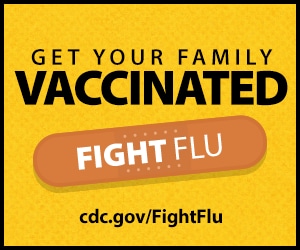A fever is a temporary rise in the body’s temperature, and a hallmark symptom of the flu. It may make you feel hot and sweaty, and you might find yourself shivering to generate more body heat to fight the virus. Rest and fluids can help with your fever symptoms, but you can also take a fever reducer like acetaminophen to temporarily relieve your fever symptoms. Acetaminophen also helps to reduce pain, which will come in helpful since headache and muscle aches also often accompany fevers from the flu. 3 Acetaminophen is found in over-the-counter cold and flu symptom relief medicines like DayQuil, NyQuil, FluTherapy, and more.
10 Ways to Treat Flu Symptoms and Feel Better
If you’re searching the web for flu treatment, you probably aren’t feeling too well right about now. Here’s the bad news: there’s no cure for it and it usually lasts for one to two weeks. And just because you have the flu doesn’t mean you won’t get it again, since there are many different strains of the flu virus. The good news? Just because there is no cure does not mean there is no way to feel better when you have the flu. There are several over-the-counter medicines available to you to help you combat the symptoms you feel while you are sick with the flu. And some medicines treat multiple symptoms in a single product.
Here’s 10 ways to treat flu symptoms at home so you can get relief while your body fights the virus.
When you first come down with the flu, rest is what will help give your body the energy it needs to fight the flu virus and flu symptoms, which is why rest is one of the go-to recommendations for people suffering from the flu. 1
Stay at home and rest, especially during the first 24 hours after becoming ill.
Consuming enough fluids is another regularly recommended practice for people who have the flu. 1 Fever, a common flu symptom, is associated with dehydration, so it is important to get adequate amounts of water or other fluids to ensure that you stay hydrated while you have the flu. 2
- Avoid contact with others.
You won’t feel better if you recover from the flu virus only to learn that your loved ones caught it from you. If you think you have the flu, it’s best to stay home and avoid close contact with those that are healthy. Flu viruses commonly spread through airborne droplets created when an infected person sneezes or coughs. Take some “me time” while you have to not only care for yourself, but also to care for those around you.
- Ask your doctor about anti-viral medicines.
Tamiflu is a prescription medication that is perhaps the most well-known antiviral drug that is used to combat the flu. But it must be taken within a day or two of the symptoms beginning. 4 Otherwise, it will not affect the course of your illness or symptoms if your symptoms have lasted more than 2 days.
- Consult your doctor.
Your healthcare provider is the best person to advise you. As discussed above, they may put you on antiviral drugs within the 48 hours of your symptoms, which can lessen the severity and duration of flu symptoms. 1
If you become very sick with the flu or are at a high risk of developing complications from the flu, call your healthcare provider.
- Lower your body temperature.
A fever is a temporary rise in the body’s temperature, and a hallmark symptom of the flu. It may make you feel hot and sweaty, and you might find yourself shivering to generate more body heat to fight the virus. Rest and fluids can help with your fever symptoms, but you can also take a fever reducer like acetaminophen to temporarily relieve your fever symptoms. Acetaminophen also helps to reduce pain, which will come in helpful since headache and muscle aches also often accompany fevers from the flu. 3 Acetaminophen is found in over-the-counter cold and flu symptom relief medicines like DayQuil, NyQuil, FluTherapy, and more.
The key to picking an over-the-counter medicine for flu symptoms is to identify what symptoms you’re experiencing from the flu. Then, you can pick a medicine that gives you much-needed relief. For the last four tips, we’ll tell you a bit more about the Vicks products that can help relieve your flu symptoms.
- Take Dayquil for non-drowsy relief during the day.
DayQuil relieves many of the uncomfortable flu symptoms that keep you distracted from doing anything besides laying on the couch all day while you have the flu. DayQuil SEVERE has acetaminophen to reduce fever and relieve sore throat, plus minor aches and pains. It also has ingredients that relieve cough, chest congestion, and nasal/sinus congestion, and sinus pressure.
- Take NyQuil before you go to bed.
NyQuil will also give you relief from flu symptoms, plus it’ll relieve your cough temporarily so you can get the sleep you need to let your body recover from the flu virus. Like DayQuil SEVERE, NyQuil SEVERE reduces fever and relieves minor aches and pains, plus it relieves sneezing, runny nose, cough, and nasal/sinus congestion, and sinus pressure.
- Opt for Flu Therapy if you prefer medicated hot drinks.
Some prefer flu symptom relief in a comforting, hot medicated drink. FluTherapy SEVERE Nighttime relieves nasal congestion, sore throat, body aches, fever, runny nose, and cough from the flu. FluTherapy SEVERE Daytime (in other words, it won’t make you drowsy), relieves nasal congestion, sore throat, body aches, fever, and cough from the flu. Dissolve the contents of a FluTherapy packet into 8 oz. of water and stir briskly. Sip it while hot within 10-15 minutes.
- Keep cold, flu, and comfort relief close.
When you come down with the flu virus, the last thing you want to do is head to the store and browse through the cold and flu aisle. Keep the cold and flu symptom relief products you need at home, so you can get relief when you need it, fast. It has ingredients that will comfort you when you have cold or flu. It comes with cold & flu essentials to help you feel better when you’re under the weather, like DayQuil and NyQuil SEVERE Liquicaps™, and more.
Healthy Habits to Help Protect Against Flu
The single best way to reduce the risk of seasonal flu and its potentially serious complications is to get vaccinated each year, but good health habits like avoiding people who are sick, covering your cough and washing your hands often can help stop the spread of germs and prevent respiratory illnesses like flu. There also are flu antiviral drugs that can be used to treat and prevent flu

Seasonal flu vaccines protect against the four flu viruses that research indicates will be most common during the upcoming season. There are several flu vaccine options this flu season.
The tips and resources below will help you learn about additional actions you can take to protect yourself and others from flu and help stop the spread of germs.
The tips and resources below will help you learn about actions you can take to protect yourself and others from flu and help stop the spread of germs.
-
- Avoid close contact.
Avoid close contact with people who are sick. When you are sick, keep your distance from others to protect them from getting sick too. - Stay home when you are sick.
If possible, stay home from work, school, and errands when you are sick. This will help prevent spreading your illness to others. - Cover your mouth and nose.
Cover your mouth and nose with a tissue when coughing or sneezing. It may prevent those around you from getting sick. Flu viruses spread mainly by droplets made when people with flu cough, sneeze or talk. - Clean your hands.
Washing your hands often will help protect you from germs. If soap and water are not available, use an alcohol-based hand rub.- Handwashing: Clean Hands Save Lives
Tips on hand washing and using alcohol-based hand sanitizers - It’s a SNAP Toolkit: Handwashing
Hand washing resources from the It’s A SNAP program, aimed at preventing school absenteeism by promoting clean hands. From the School Network for Absenteeism Prevention, a collaborative project of the CDC, the U.S. Department of Health and Human Services and the American Cleaning Institute.
- Handwashing: Clean Hands Save Lives
- Avoid touching your eyes, nose or mouth.
Germs can be spread when a person touches something that is contaminated with germs and then touches his or her eyes, nose, or mouth. - Practice other good health habits.
Clean and disinfect frequently touched surfaces at home, work or school, especially when someone is ill. Get plenty of sleep, be physically active, manage your stress, drink plenty of fluids, and eat nutritious food.
In the context of the COVID-19 pandemic, local governments or public health departments may recommend additional precautions be taken in your community. Follow those instructions.

Nonpharmaceutical interventions (NPIs), are actions – apart from getting vaccinated or taking medicine – that people and communities can take to help slow the spread of illnesses like flu.
Preventing Flu at Work and School
At School
- Find out about plans your child’s school, childcare program, and/or college has if an outbreak of flu or another illness occurs and whether flu vaccinations are offered on-site.
- Make sure your child’s school, childcare program, and/or college routinely cleans frequently touched objects and surfaces, and that they have a good supply of tissues, soap, paper towels, alcohol-based hand rubs, and disposable wipes on-site.
- Ask how sick students and staff are separated from others and who will care for them until they can go home, and about the absentee policy for sick students and staff.
Learn more about preventing the flu, common questions and answers, and poster materials for schools: Resources for Schools, Childcare Providers and Parents
At Work
- Find out about your employer’s plans if an outbreak of flu or another illness occurs and whether flu vaccinations are offered on-site.
- Routinely clean frequently touched objects and surfaces, including doorknobs, keyboards, and phones, to help remove germs.
- Make sure your workplace has an adequate supply of tissues, soap, paper towels, alcohol-based hand rubs, and disposable wipes.
- Train others on how to do your job so they can cover for you in case you or a family member gets sick and you have to stay home.
- If you begin to feel sick while at work, go home as soon as possible.
Learn more about how you can help prevent the spread of respiratory illnesses like flu at work : Flu Prevention at Work
Materials for Promoting Flu Prevention
- How to Prevent Flu
- Every Day Preventive Actions Flyer [1.5 MB, 2 Pages, 8.5” x 11”]
- Spanish [1.3 MB, 2 pages, 8.5” x 11”]
- Avoid close contact.





